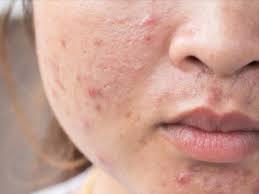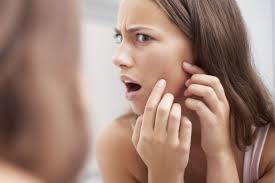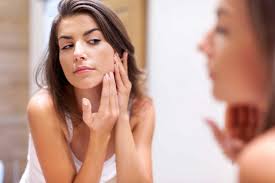All About Acne
Why you have acne
There are a million reasons why you could have acne and skin problems. Most people fall under one or more of these categories.
Dairy protein intolerance and breakouts
Researchers found a high correlation between dairy consumption, especially skim milk, and teenage acne. One reason why is that conventional dairy products contain enough hormones to have an effect on your body. You can see the effects of excess hormones on your skin.
Skin inflammation from insulin resistance
Insulin sensitivity or resistance describes how efficiently your body is able to get energy out of sugar and carbs. Sensitivity is good, insulin resistance means that the cell fuel delivery guy knocks on the door and nobody answers. Your cells do not open up to receive glucose, so sugar stays in the bloodstream, causing inflammation.
If you’re insulin resistant, you’re probably carrying excess weight and having negative effects from blood sugar fluctuations. Other signs of insulin resistance include increased thirst, feeling cranky in between meals, fatigue, even blurred vision.
Researchers have connected the dots between acne and insulin resistance, though there’s plenty of room for more research on the topic to fully understand it. Since there are so many benefits to cutting sugar and lowering your carb intake, you may as well see if those things improve your acne.
Irritation from harsh skincare
If this is your first experience with acne, you might be tempted to go nuclear on it, and wind up buying the most drying, highest-strength stuff on the shelf. Though intuitively it feels like the right move, there are a few problems with that strategy.
First, your skin has its own microbiome, an ecosystem of microscopic organisms living on its surface. A healthy level of oil on your skin helps support beneficial microorganisms that keep your skin clear, calm, and happy.
Second, when your skin oils are in balance, your skin’s oil production is a supply and demand system. If it’s dry, you make more oil. Oily, you make less. Things like hormones, insulin, and toxins can disrupt the balance. If you intentionally dry out your skin, thinking that removing oil is good for you, your skin will respond by ramping up oil production. Then you get more acne. If you’ve ever broken out after a really intense exfoliation regimen, you likely went too hard on your skin. That’s your complexion trying to restore order after disrupting the skin’s lipid barrier.
Same goes for harsh chemicals. Your skin may react to products you use, giving you acne, or something that looks like acne but is actually irritation. Avoid heavy fragrances, strong astringents, allergens, and other irritants to keep skin smooth.

How do dermatologists diagnose acne?
If you have acne, a dermatologist can diagnose you by looking at your breakouts. During your appointment, a dermatologist will also note what types of acne you have and where the breakouts appear on your skin. This helps your dermatologist create an effective treatment plan.
Sometimes what looks like acne isn’t acne. While rare, what looks like acne can be another condition. For example, some people mistake hidradenitis suppurativa, also called acne inversa, for everyday acne. Treatment for this condition differs from that for acne.
Another condition that can be mistaken for acne is perioral dermatitis. It often causes breakouts that look like acne around the mouth.
Seeing a board-certified dermatologist can be reassuring. Whether you have stubborn acne or another condition, a board-certified dermatologist can diagnose you and create a treatment plan tailored to your needs.
How do dermatologists treat acne?
The acne treatment plan that’s right for you depends on many considerations, including:
- What type of acne (i.e., blackheads, pimples, etc.) you have
- Where the acne appears on your skin
- What treatments you’ve already tried
- When the breakouts started
- Your age
- Whether the acne has left you with dark spots or scars

Procedures to treat acne
Though not prescribed as commonly as medication, a few medical procedures may be used to treat severe acne. These procedures can all typically be performed in your doctor’s office. They may be painful and in some cases cause scarring. Health insurance plans don’t always cover them, either. You should confirm that your health insurance will cover these procedures before you schedule them.
Drainage and extraction
During drainage and extraction, your doctor manually drains large cysts that form under your skin. They remove fluids, dirt, pus, and dead skin inside the cyst to reduce infection and pain. Your doctor may inject antibiotics or a steroid into the cyst to speed healing and reduce the risk of scarring.
Laser therapy
Laser therapy may also help improve acne infection. Laser light helps reduce the amount of bacteria on your skin that causes acne.
Chemical peels and microdermabrasion
Chemical peels and microdermabrasion remove the top layer of your skin. In the process, whiteheads and blackheads are also removed.

Treating acne from the inside out
Fix your gut
One of the big root causes behind acne has to do with the gut, the gut microbiome. She advocates addressing gut imbalances that create problems in your whole body, the most noticeable place being the skin.
Diet
There’s a lot of research linking dairy protein consumption and acne. Another big one is sugar.
If you eat a lot of sugar or foods that turn to sugar, things that are high on the glycemic index, they’re going to increase your blood sugar, which causes a spike in the hormone, insulin. That increase actually triggers excess sebum production, the oils in our skin, plus it increases androgen activity. That combination is one of the big triggers for acne.
Aside from insulin, too much sugar wrecks your gut, and a lot of skin problems originate in the gut. There’s no shortage of reasons to stop eating sugar.
Address hormone imbalances
Acne is a hallmark of hormone imbalance. Since there are so many causes of estrogen dominance and other endocrine imbalances, you’ll want to work with a functional medicine doctor on this one. Functional medicine aims to uncover the root cause of a problem, while conventional medicine most often treats symptoms.
Hormones are complicated business, so you should dig as deep as you and your doctor can to address the chain reaction that leads to hormone problems and hormonal acne.
Hydrate, then hydrate more
Drink as much water as you think you need, then double that. Your urinary system is a detox machine that runs constantly as long as it has enough water to flow freely, picking up impurities along the way. Water also leaves your body as sweat, which will sweep toxins away much more efficiently the more you dilute them. While you’re at it, exercise and sauna help you sweat nasty things out, too.
What not to do for acne
Don’t take antibiotics as a first line of action
If you’re looking into prescriptions, you’re probably pretty frustrated with your acne at this point. When you consider antibiotics, you have to weigh the pros with the cons to see if antibiotics are worth it. Is it a short-term solution, and will you have to keep repeating antibiotics? Is it worth wrecking your gut, knowing that there’s an intricate relationship between your skin and your gut?
You can opt for topical antibiotics, which are certainly better than pills, but keep in mind that your skin has a microbiome that antibiotics will disrupt.
It takes patience, but it might be a better option to support your immune system and address imbalances first.
Don’t take an isotretinoin prescription without trying everything else first (everything)
Sure, desperate times call for desperate measures. But medicines containing isotretinoin not only mask the true issue — they can cause serious lifelong side effects like:
- Crohn’s disease
- Depression and suicide
- Anxiety
- Severe birth defects if you take it while pregnant
The most well-known isotretinoin brand, Accutane®, is no longer available, but doctors still prescribe other isotretinoin brands with the same set of risks.
Isotretinoin permanently affects the communication lines in your hypothalamic-pituitary-adrenal axis[20] which is “mission control” for your stress response, among countless other functions.
This is one of those times when even if your doctor extensively counsels you on this medication, you probably still will not cover the magnitude of long-term damage it can cause. Tread lightly. Get a second, third, and fourth opinion if you have to.
Don’t treat only pimples
Pimples aren’t simply a skin condition. They’re a signal that something else is going on in your body. Keep asking your doctor, “what caused that?” until you have a handle on the root cause. If you treat acne without treating the source, it won’t go away. Sure, use what makes sense to get your skin looking better, but keep digging for the true reason.
You’re not vain for wanting clear skin. Your appearance affects your job, your interactions, and your confidence. More importantly, your skin indicates how your body is working. Look at your skin as a main line of communication between the inside and the outside of your body.